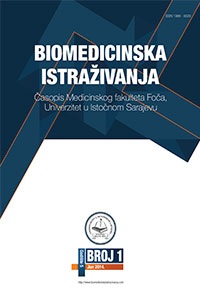Dietary patterns and onset of obesity among medical students in Banja Luka
DOI:
https://doi.org/10.7251/BII2002102SAbstract
Introduction. The World Health Organization (WHO) revealed that in 2016
more than 1.9 billion adults, 18 years and older, were overweight. Over
650 million of them were obese. Diet quality in university students is determined
by factors such as family, food availability and meals in student
canteens. The purpose of this study was to investigate frequency of obesity
and its relation to dietary habits, gender and age/year of study among
medical students at the Faculty of Medicine of the University of Banja Luka.
Methods. This is a prospective and descriptive study conducted among
1-6 year student population at the Faculty of Medicine of the University of
Banja Luka. The study includes a validated survey instrument Youth Risk Behavior
Survey Questionnaires. The study was approved by the Ethics Committee
of the Faculty of Medicine and carried out as an anonymous survey
during the winter term of the academic year 2017/2018.
Results. Out of the total 601 students, the research sample included 543
students: 327 female (60.2%) and 216 (39.8%) male students. The majority
of them (62.1%) fell within healthy weight range, and 2.4% were class
1 obesity. Most of female students (75.7%) had healthy weight while their
male counterparts (73.2%) were overweight. To sum up, 57.5% of them
consumed breakfast every day: female students significantly more (60.6%)
than male students (51.9%). Third-year students (59.4%) had breakfast most
frequently compared to the fifth-year students (55.0%) who ate it the least.
Conclusion. The study found a high prevalence of overweight among male
respondents compared to their female counterparts, who had predominantly
healthy weight.

